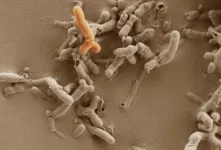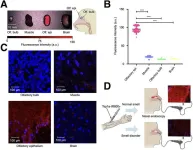(Press-News.org) Meat consumption, particularly consumption of processed meat and unprocessed red meat, is associated with a higher type 2 diabetes risk, an analysis of data from 1.97 million participants, published today in The Lancet Diabetes and Endocrinology, has found.
Global meat production has increased rapidly in recent decades and meat consumption exceeds dietary guidelines in many countries. Earlier research indicated that higher intakes of processed meat and unprocessed red meat are associated with an elevated risk of type 2 diabetes, but the results have been variable and not conclusive.
Poultry such as chicken, turkey, or duck is often considered to be an alternative to processed meat or unprocessed red meat, but fewer studies have examined the association between poultry consumption and type 2 diabetes.
To determine the association between consumption of processed meat, unprocessed red meat and poultry and type 2 diabetes, the team led by researchers at the University of Cambridge used the global InterConnect project to analyse data from 31 study cohorts in 20 countries. Their extensive analysis took into account factors such as age, gender, health-related behaviours, energy intake and body mass index.
The researchers found that the habitual consumption of 50 grams of processed meat a day - equivalent to 2 slices of ham - is associated with a 15% higher risk of developing type 2 diabetes in the next 10 years. The consumption of 100 grams of unprocessed red meat a day - equivalent to a small steak - was associated with a 10% higher risk of type 2 diabetes.
Habitual consumption of 100 grams of poultry a day was associated with an 8% higher risk, but when further analyses were conducted to test the findings under different scenarios the association for poultry consumption became weaker, whereas the associations with type 2 diabetes for each of processed meat and unprocessed meat persisted.
Professor Nita Forouhi of the Medical Research Council (MRC) Epidemiology Unit at the University of Cambridge, and a senior author on the paper, said:
“Our research provides the most comprehensive evidence to date of an association between eating processed meat and unprocessed red meat and a higher future risk of type 2 diabetes. It supports recommendations to limit the consumption of processed meat and unprocessed red meat to reduce type 2 diabetes cases in the population.
While our findings provide more comprehensive evidence on the association between poultry consumption and type 2 diabetes than was previously available, the link remains uncertain and needs to be investigated further.”
InterConnect uses an approach that allows researchers to analyse individual participant data from diverse studies, rather than being limited to published results. This enabled the authors to include as many as 31 studies in this analysis, 18 of which had not previously published findings on the link between meat consumption and type 2 diabetes. By including this previously unpublished study data the authors considerably expanded the evidence base and reduced the potential for bias from the exclusion of existing research.
Lead author Dr Chunxiao Li, also of the MRC Epidemiology Unit, said:
“Previous meta-analysis involved pooling together of already published results from studies on the link between meat consumption and type 2 diabetes, but our analysis examined data from individual participants in each study. This meant that we could harmonise the key data collected across studies, such as the meat intake information and the development of type 2 diabetes.
Using harmonised data also meant we could more easily account for different factors, such as lifestyle or health behaviours, that may affect the association between meat consumption and diabetes. “
Professor Nick Wareham, Director of the MRC Epidemiology Unit, and a senior author on the paper said:
“InterConnect enables us to study the risk factors for obesity and type 2 diabetes across populations in many different countries and continents around the world, helping to include populations that are under-represented in traditional meta-analyses.
Most research studies on meat and type 2 diabetes have been conducted in USA and Europe, with some in East Asia. This research included additional studies from the Middle East, Latin America and South Asia, and highlighted the need for investment in research in these regions and in Africa.
Using harmonised data and unified analytic methods across nearly 2 million participants allowed us to provide more concrete evidence of the link between consumption of different types of meat and type 2 diabetes than was previously possible.”
InterConnect was initially funded by the European Union’s Seventh Framework Programme for research, technological development and demonstration under grant agreement no 602068.
Reference
Li, C et al. Meat consumption and incident type 2 diabetes: a federated meta-analysis of 1·97 million adults with 100,000 incident cases from 31 cohorts in 20 countries. Lancet Diabetes Endocrinol.; 20 August 2024. DOI:10.1016/S2213-8587(24)00179-7
ENDS
About the University of Cambridge
The University of Cambridge is one of the world’s leading universities, with a rich history of radical thinking dating back to 1209. Its mission is to contribute to society through the pursuit of education, learning and research at the highest international levels of excellence.
The University comprises 31 autonomous Colleges and over 100 departments, faculties and institutions. Its 24,000 students include around 9,000 international students from 147 countries. In 2023, 73% of its new undergraduate students were from state schools and more than 25% from economically disadvantaged backgrounds.
Cambridge research spans almost every discipline, from science, technology, engineering and medicine through to the arts, humanities and social sciences, with multi-disciplinary teams working to address major global challenges. In the Times Higher Education’s rankings based on the UK Research Excellence Framework, the University was rated as the highest scoring institution covering all the major disciplines.
A 2023 report found that the University contributes nearly £30 billion to the UK economy annually and supports more than 86,000 jobs across the UK, including 52,000 in the East of England. For every £1 the University spends, it creates £11.70 of economic impact, and for every £1 million of publicly-funded research income it receives, it generates £12.65 million in economic impact across the UK.
The University sits at the heart of the ‘Cambridge cluster’, in which more than 5,000 knowledge-intensive firms employ more than 71,000 people and generate £21 billion in turnover. Cambridge has the highest number of patent applications per 100,000 residents in the UK.
www.cam.ac.uk
About the MRC Epidemiology Unit
The MRC Epidemiology Unit is a department at the University of Cambridge. It is working to improve the health of people in the UK and around the world. Obesity, type 2 diabetes and related metabolic disorders present a major and growing global public health challenge. These disorders result from a complex interplay between genetic, developmental, behavioural and environmental factors that operate throughout life. The mission of the Unit is to investigate the individual and combined effects of these factors and to develop and evaluate strategies to prevent these diseases and their consequences. www.mrc-epid.cam.ac.uk
About the Medical Research Council
The Medical Research Council is at the forefront of scientific discovery to improve human health. Founded in 1913 to tackle tuberculosis, the MRC now invests taxpayers’ money in some of the best medical research in the world across every area of health. Thirty-three MRC-funded researchers have won Nobel prizes in a wide range of disciplines, and MRC scientists have been behind such diverse discoveries as vitamins, the structure of DNA and the link between smoking and cancer, as well as achievements such as pioneering the use of randomised controlled trials, the invention of MRI scanning, and the development of a group of antibodies used in the making of some of the most successful drugs ever developed. Today, MRC-funded scientists tackle some of the greatest health problems facing humanity in the 21st century, from the rising tide of chronic diseases associated with ageing to the threats posed by rapidly mutating micro-organisms. The Medical Research Council is part of UK Research and Innovation. https://mrc.ukri.org/
END
Red and processed meat consumption associated with higher type 2 diabetes risk, study of two million people finds
Study published in The Lancet Diabetes and Endocrinology finds meat consumption, particularly consumption of processed meat and unprocessed red meat, is associated with a higher type 2 diabetes risk, an analysis of data from 1.97 million participants
2024-08-21
ELSE PRESS RELEASES FROM THIS DATE:
Environmental laws failing to slow deforestation
2024-08-21
Australia’s environmental laws are failing to stop high rates of tree clearing to make way for agriculture, development and mining, according to University of Queensland research.
PhD candidate Hannah Thomas from UQ’s School of the Environment led a team which used satellite mapping and land clearing data to analyse vegetation loss across northern Australia, including Queensland, the Northern Territory and Western Australia.
“We mapped clearing greater than 20 hectares and then investigated which national or state and territory laws were likely to apply,” Ms Thomas said.
“Of the 1.5 million hectares ...
Mother’s gut microbiome during pregnancy shapes baby’s brain development
2024-08-21
A study in mice has found that the bacteria Bifidobacterium breve in the mother’s gut during pregnancy supports healthy brain development in the fetus.
Researchers have compared the development of the fetal brain in mice whose mothers had no bacteria in their gut, to those whose mothers were given Bifidobacterium breve orally during pregnancy, but had no other bacteria in their gut.
Nutrient transport to the brain increased in fetuses of mothers given Bifidobacterium breve, and beneficial changes were also seen in other cell processes relating to growth.
Bifidobacterium breve is a ‘good bacteria’ that occurs naturally in our ...
Humpbacks are among animals who manufacture and wield tools
2024-08-21
In a study published today in Royal Society Open Science, researchers at the Marine Mammal Research Program (MMRP) at UH Hawaiʻi Institute of Marine Biology (HIMB) and Alaska Whale Foundation (AWF) consider a new designation of the humpback whales they study: tool wielders. Researchers have known that humpback whales create “bubble-nets” to hunt, but they have learned that the animals don’t just create the bubble-nets; they manipulate this unique tool in a variety of ways to maximize their food intake in Alaskan feeding grounds. This novel research demystifies a behavior key to the whales’ survival and offers a compelling case for including humpbacks among the rare ...
UTA federal research expenditures doubled in 2023
2024-08-20
In 2023, federally sponsored research at The University of Texas at Arlington accounted for $77 million in expenditures, with about $40.7 million spent on research-related goods and services in Texas. That more than doubles the total for 2022, when federally sponsored research at UTA contributed $38 million to the economy.
The $77 million is a portion of UTA’s $122 million in total research expenditures from all sources last year. This number includes federally sponsored research awards as well as those from local and state governments, private institutions, and other sources. Overall, UT Arlington and its 270,000 alumni contribute $29 billion ...
Researchers teaching artificial intelligence about frustration in protein folding
2024-08-20
Scientists have found a new way to predict how proteins change their shape when they function, which is important for understanding how they work in living systems. While recent artificial intelligence (AI) technology has made it possible to predict what proteins look like in their resting state, figuring out how they move is still challenging because there is not enough direct data from experiments on protein motions to train the neural networks.
In a new study published in the Proceedings of the National Academy of Sciences on Aug.20, ...
Novel molecular imaging tool objectively measures and diagnoses smell disorders
2024-08-20
Reston, VA (August 20, 2024) -- A new fluorescent imaging probe can for the first time objectively and non-invasively measure loss of smell, clinically known as anosmia. Targeting the olfactory nerve, the new tool has potential to eliminate biopsies used to diagnose certain anosmia conditions and to aid in the development of therapeutic interventions. This research was published in the August issue of The Journal of Nuclear Medicine.
Research shows that an estimated 13.3 million adults in the United States have a vast range of smell disorders and that ...
Tiny killers: How autoantibodies attack the heart in lupus patients
2024-08-20
New York, NY—August 20, 2024—Cardiovascular disease is the leading cause of death in patients suffering from lupus, an autoimmune disease in which our immune system attacks our own tissues and organs, the heart, blood, lung, joints, brain, and skin. Lupus myocarditis--inflammation of the heart muscle-- can be very serious because the inflammation alters the regularity of the rhythm and strength of the heartbeat. However, the mechanisms underlying this complex disease are poorly understood and difficult to study.
A long-standing question about lupus is why some patients develop myocarditis while others remain unaffected. And why the clinical manifestations of affected ...
Study: Temporarily removing firearms from people at risk of harm saves lives
2024-08-20
DURHAM, N.C. – An estimated one life was saved for every 17 times an extreme risk protection order removed guns from people who presented a risk of harming themselves or others, according to a Duke Health-led analysis of the laws in four states.
Extreme risk protection orders -- known as ERPOs or “red flag laws" -- are civil court orders that temporarily prevent people from accessing firearms after a judge determines that they pose an imminent risk of harming themselves or others. Twenty-one states and the District of Columbia have enacted ERPO laws, mostly in ...
Study finds Americans want pandemic-era ease of applying for Medicaid
2024-08-20
More than 23 million Americans who were granted Medicaid coverage during the COVID-19 pandemic lost their coverage starting in March 2023 after the pandemic was declared no longer a public health emergency. Many likely will not successfully re-enroll on their own given Medicaid’s administrative burden—the frustrations and challenges people often encounter in seeking or complying with coverage.
Now, a study of the so-called Medicaid Great Unwinding by Dr. Simon F. Haeder with the Texas A&M University School of Public Health, ...
It only takes 15 minutes to change your health
2024-08-20
Corporate Cup, lunchtime yoga, or even ‘walk and talks’, organisations come up with all sorts of wellness initiatives to encourage people to be more active in the workplace. But before you duck and hide, new research shows that all it takes is 15 minutes and a touch of gamification to put you on the path to success.
Assessing results from 11,575 participants, across 73 Australian, New Zealand, and UK companies, University of South Australia researchers found that a gamified workplace wellness program – the 15 Minute Challenge* - leads to substantial increases in physical activity levels, with 95% of participants meeting (36%) or exceeding (59%) ...
LAST 30 PRESS RELEASES:
Putting some ‘muscle’ into material design
House fires release harmful compounds into the air
Novel structural insights into Phytophthora effectors challenge long-held assumptions in plant pathology
Q&A: Researchers discuss potential solutions for the feedback loop affecting scientific publishing
A new ecological model highlights how fluctuating environments push microbes to work together
Chapman University researcher warns of structural risks at Grand Renaissance Dam putting property and lives in danger
Courtship is complicated, even in fruit flies
Columbia announces ARPA-H contract to advance science of healthy aging
New NYUAD study reveals hidden stress facing coral reef fish in the Arabian Gulf
36 months later: Distance learning in the wake of COVID-19
Blaming beavers for flood damage is bad policy and bad science, Concordia research shows
The new ‘forever’ contaminant? SFU study raises alarm on marine fiberglass pollution
Shorter early-life telomere length as a predictor of survival
Why do female caribou have antlers?
How studying yeast in the gut could lead to new, better drugs
Chemists thought phosphorus had shown all its cards. It surprised them with a new move
A feedback loop of rising submissions and overburdened peer reviewers threatens the peer review system of the scientific literature
Rediscovered music may never sound the same twice, according to new Surrey study
Ochsner Baton Rouge expands specialty physicians and providers at area clinics and O’Neal hospital
New strategies aim at HIV’s last strongholds
Ambitious climate policy ensures reduction of CO2 emissions
Frontiers in Science Deep Dive webinar series: How bacteria can reclaim lost energy, nutrients, and clean water from wastewater
UMaine researcher develops model to protect freshwater fish worldwide from extinction
Illinois and UChicago physicists develop a new method to measure the expansion rate of the universe
Pathway to residency program helps kids and the pediatrician shortage
How the color of a theater affects sound perception
Ensuring smartphones have not been tampered with
Overdiagnosis of papillary thyroid cancer
Association of dual eligibility and medicare type with quality of postacute care after stroke
Shine a light, build a crystal
[Press-News.org] Red and processed meat consumption associated with higher type 2 diabetes risk, study of two million people findsStudy published in The Lancet Diabetes and Endocrinology finds meat consumption, particularly consumption of processed meat and unprocessed red meat, is associated with a higher type 2 diabetes risk, an analysis of data from 1.97 million participants






